“Wayuu strength!” My guide Iisho turned to face me, laughing as he showed off the muscles in one arm, brandishing the newly patched-up tire in the other. I laughed, watching as he reinstalled the tire on his motorbike with expert ease.
His composure hinted as though he’d been in this situation before – in the middle of the desert, patching up his motorbike that is. And I suppose he had – this was his territory after all, the ancestral homeland of his clan. He had navigated the roadless desert to this point with ease, my life completely in his hands as we soared across the arid landscape.
This was how much of my journey through the department of La Guajira went, a trip characterized by bumpy roads and new friends and at the end of the day – giving up control. I was out of my element, in an unforgiving landscape, and had no choice other than to trust those around me to know best. It was the stuff adventure travel is made of.
Colombia’s northernmost department of La Guajira is known for this type of adventure, an off-the-beaten track destination yet to become a part of Colombia’s well-trodden backpacker trail. While most travelers opt to take a tour through La Guajira – a route that I actually generally recommend in this case – I opted to travel independently without a tour.
In this article, I’ll be sharing my experience visiting this region without a guided tour, from roadside motorbike fixes to the ins and outs of transportation. Finally I’ll share my thoughts – and if I think it’s really worth it to visit La Guajira independently.
This site uses affiliate links to share products that I use and love! If you click on one of the links I may receive a small commission at no additional cost to you. This helps keep my site up and running — thank you!
La Guajira Video
Curious about my independent trip through La Guajira? Check out this video I made!
Colombia Quick Links
✈️ Flights – Use Kiwi.com or WayAway to find the cheapest and fastest flights to Colombia
🛏️ Accommodation – Find the best places to stay throughout Colombia on Booking.com
✅ Get Insured – I personally use Safety Wing Nomad Insurance for my travels all around the world! VisitorsCoverage is another great option.
🚗 Rent a Car – Find the best deals for a Colombia road trip on RentalCars.com
🗺️ Find Things to Do – Check out Get Your Guide or Viator for exciting adventures all around Colombia
☎ Buy a Sim – Airalo offers eSIMS for over 200 countries and regions
Looking to spend more time in Colombia? Check out my full 3-week itinerary!
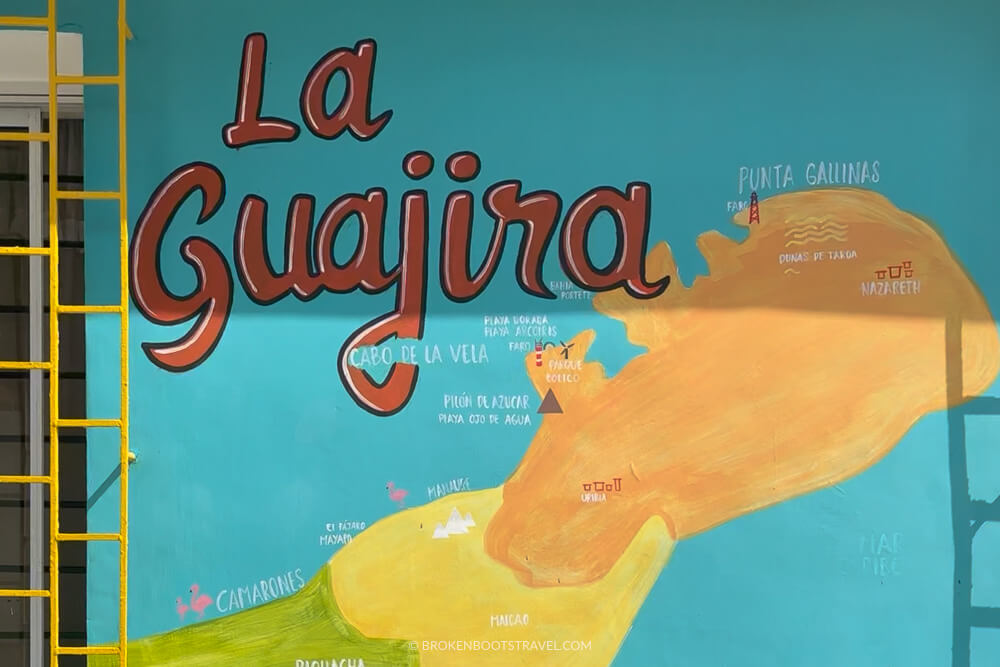
Safety in La Guajira
Quickly before I begin this guide, I want to touch on safety in the department of La Guajira. The region is one of the poorest in the country, meaning that infrastructure, tourist and otherwise, is not as well developed as other areas of the Colombian coast. You may find that roads are not as well maintained and there is a high amount of trash around.
Roadblocks are perhaps the largest concern when traveling in La Guajira. Basically, these are chains or ropes held across the roads by locals (usually children) who ask for a “toll” in order to pass – usually a snack or water will do.
However, I found these not to be as large of an issue as I anticipated. Drivers of public transportation know how to handle the roadblocks, so as long as you’re not driving yourself (which I don’t recommend anyway!) this didn’t turn out to be much of a concern at all. If you do feel like giving a toll at roadblocks, a small bag of water or packet of crackers will do.
Remember: When you travel with a tour agency, they assume part of the responsibility for your safety, which obviously does not apply when traveling independently. While I do not think that independent travel in La Guajira is inherently unsafe, I do encourage you to travel with extra precaution. Always keep some money stored safely at home, do not make yourself a target, and travel with others/in groups when possible.
To learn more about safety in La Guajira, and in Colombia in general, check out my in-depth guide to safely visiting the country.
Know Before You Go
I learned some lessons the hard way traveling without a tour through La Guajira. Here are some of the biggest things to know before you take your own trek up to Colombia’s northernmost department.
First of all, there are no ATMs north of Riohacha. This means you’ll need to take all the cash you may think you need with you, as you won’t be able to take any more out once you leave the city. If you’re desperate, there is one place in Cabo de la Vela that can help you retire money, the Jugueria, but it comes with a hefty fee of 15% and you can only take out 100,000 COP at a time.
I took out 600,000 COP ($145 USD) before heading up to La Guajira, which ended up being fine, though I cut it close. I didn’t anticipate quite how inflated prices would be for food and snacks, and ended up taking a little money out at the Jugueria on the last day of my trip just to have an emergency cushion for the ride back to Riohacha. Especially if you don’t have a set-plan and might spend more time in Cabo, I recommend taking out at least 800,000 COP ($192 USD) per person before your trip.
Finally, if possible, it’s best to carry small bills with you. Especially in La Guajira Alta, near Punta Gallinas, there is rarely change for larger bills, so you’ll find yourself in a pinch if you only have 50s. You can visit a grocery store or pharmacy in Riohacha or Uribia to help you break larger bills if need be.
Interested in Colombia’s cultural traditions? Check out this in-depth guide to Christmas around the country!
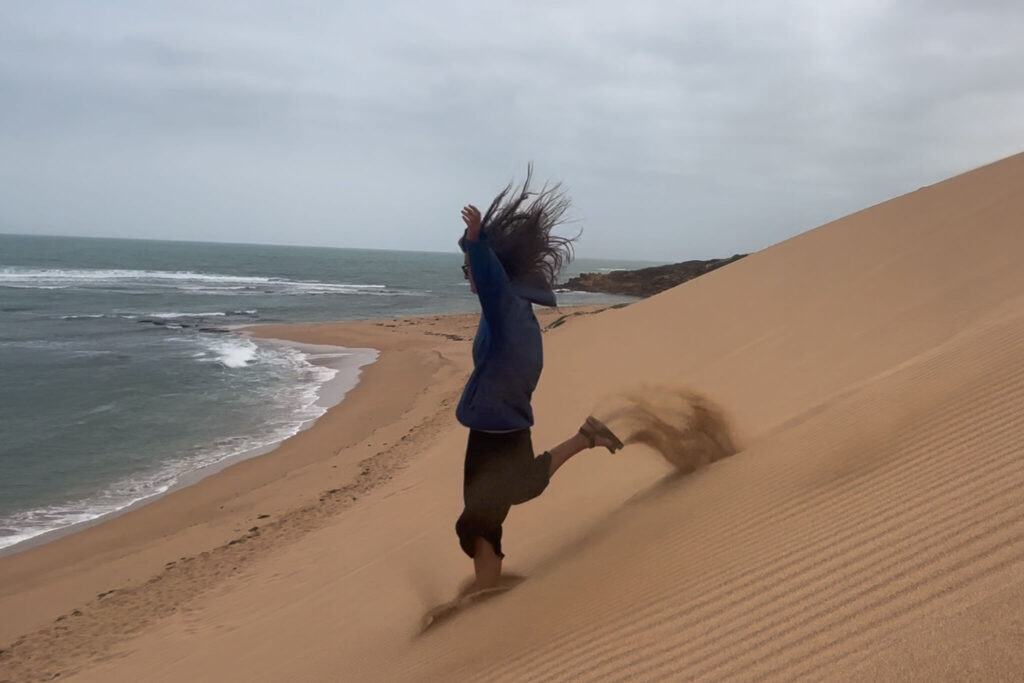
How To Visit La Guajira Without a Tour
The moment you’ve been waiting for! When I told some of my Colombian friends I’d decided to visit La Guajira without a tour they thought I was a little crazy – but it actually turned out to be more straightforward than I anticipated! Here’s a breakdown of my trip, and everything I spent along the way.
Interested in the indigenous cultures of coastal Colombia? Consider a trek to the Lost City, a sacred site of the Precolumbian Tayrona people!
Day 1: Riohacha
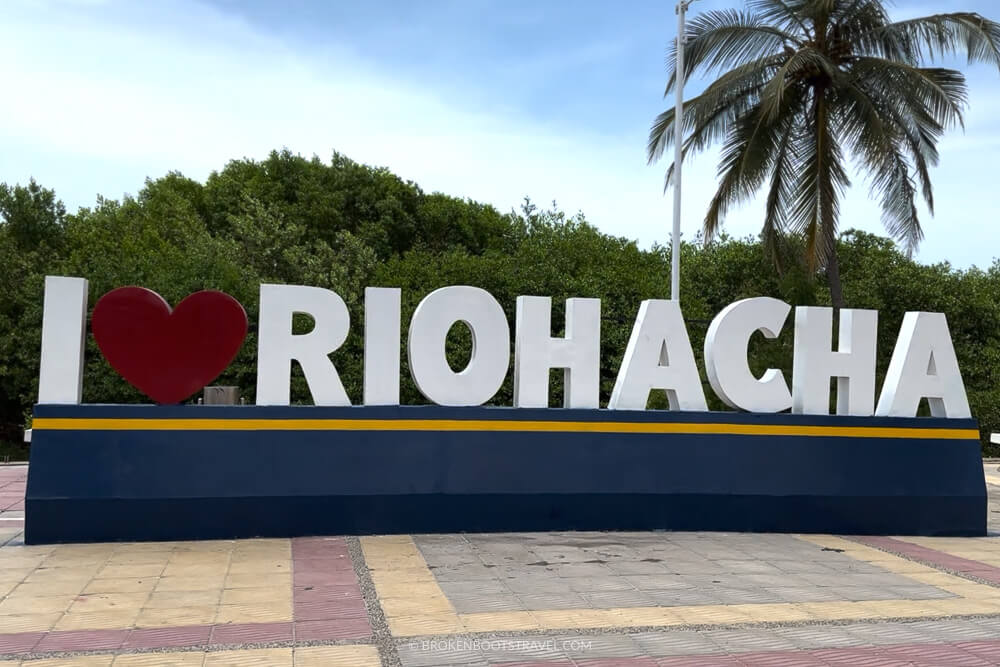
The first stop on my La Guajira trip was the capital city of Riohacha. I actually came from Palomino – a nearby beach town on the border of the departments of La Guajira and Magdalena, but you could take a bus to Riohacha directly from many of Colombia’s major coastal cities.
I spent a day in Riohacha before heading further north, exploring the city and stocking up on supplies for the trip. I’d been advised by a friend to purchase water and non-perishable foods beforehand, as prices are highly inflated in the isolated desert towns, so I bought some peanut butter and jelly supplies, snacks, and a litre jug of water.
There’s not a lot to do in Riohacha, but it’s a colorful, mid-size city with nice beaches to enjoy. If you’re short on time I wouldn’t necessarily advise extending your stay for extra time in the city, but it’s a nice place to begin and end a trip to La Guajira.
Where I Stayed in Riohacha
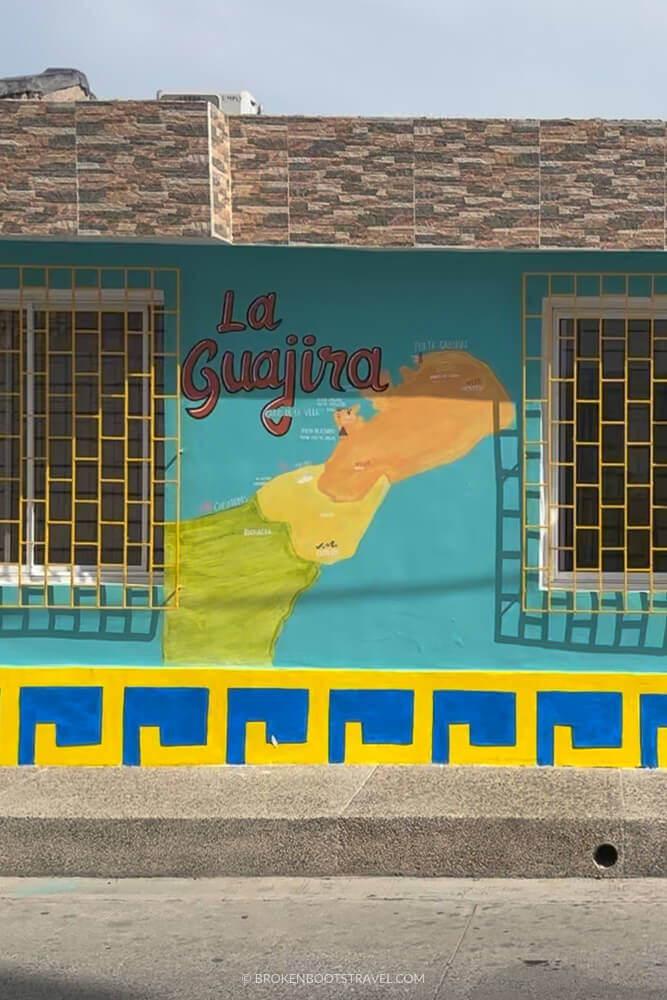
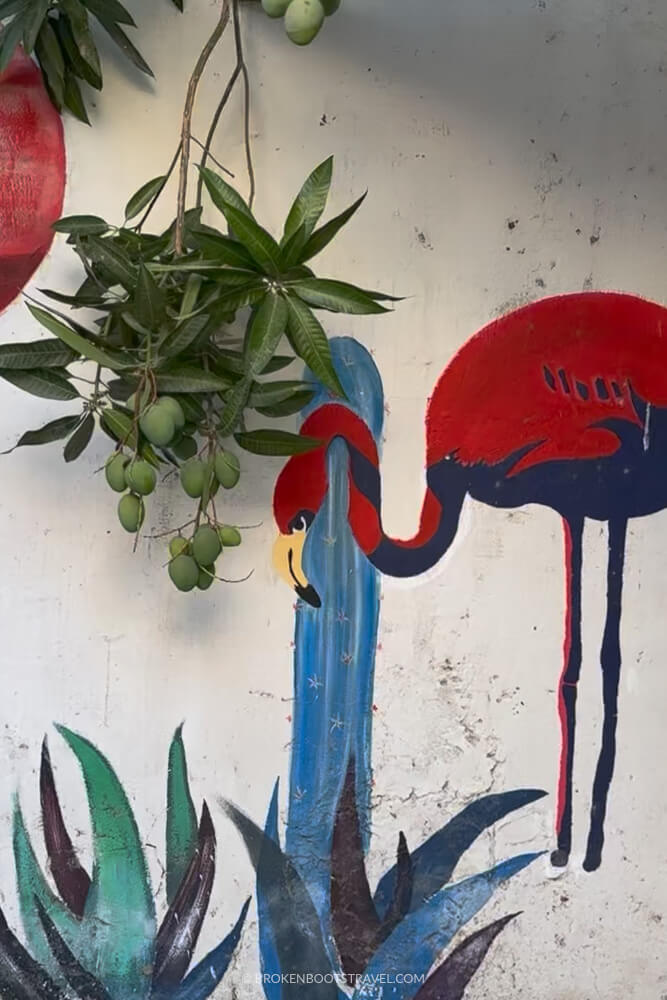
I stayed at Casa Colibrí during my time in Riohacha, and it’s probably my favorite Airbnb I’ve ever found. Hosted by Leo and Ana, the house is covered with colorful murals representing the cultures of La Guajira and the hosts made me feel right at home.
The house is located just a few blocks from Riohacha’s Malecón, or boardwalk, so it’s an easy walk to restaurants, shopping, and beaches. It’s a great, central location to spend a day exploring the city and stocking up on supplies.
Leo and Ana’s son also runs Colibrí Viajes, guided tours to many different sites through La Guajira. If you’re not looking to DIY, I highly recommend him!
Day 2: Travel to Cabo de la Vela
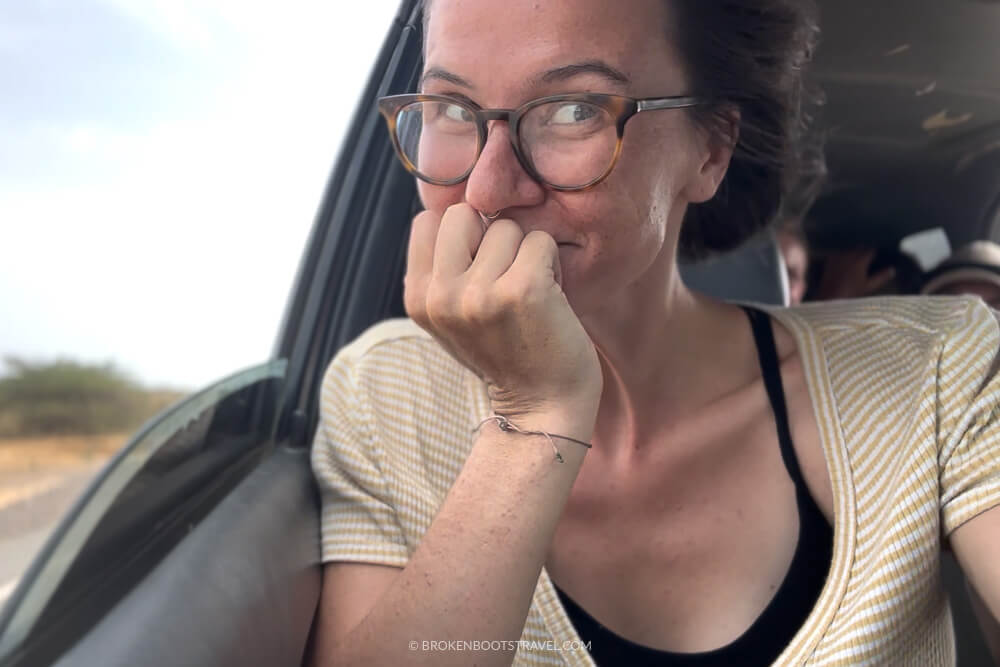
The starting point for many travelers towards Alta Guajira is the town of Cabo de La Vela. This seaside town is located on Wayuu territory belonging to the Uribia clan, and is not only home to centuries of Wayuu history but some of the most extraordinary natural sites in the region.
Riohacha to Uribia
From Riohacha, travel time to Cabo de la Vela is about 3 hours and involves a stop in the city of Uribia along the way. First, you’ll need to take a mototaxi to the transportation hub – simply ask the mototaxi driver to take you to where you can find cars to Uribia. The mototaxi itself should cost anywhere from 3,000-5,000 COP.
Once you’ve been dropped by the cars to Uribia, you’ll likely immediately be bombarded by drivers offering you a ride. The driver itself doesn’t really matter, but ask around a bit to see if there’s a difference in price. I paid 30,000 COP in April 2024, which seemed to be the standard price at the time. The drive to Uribia takes about an hour from Riohacha.
Uribia to Cabo de La Vela
Once you arrive in Uribia, the driver will drop you at a small roadside stand at the entrance of the city, where 4x4s pass to take passengers to Cabo de la Vela. Drivers pass by around every hour, so depending on when you arrive, you may need to wait a bit.
The 4×4 from Uribia to Cabo de la Vela costs 50,000 and takes around an hour and a half. Note that this is a set price, so there’s really no need to try to haggle.
Where I Stayed in Cabo de La Vela
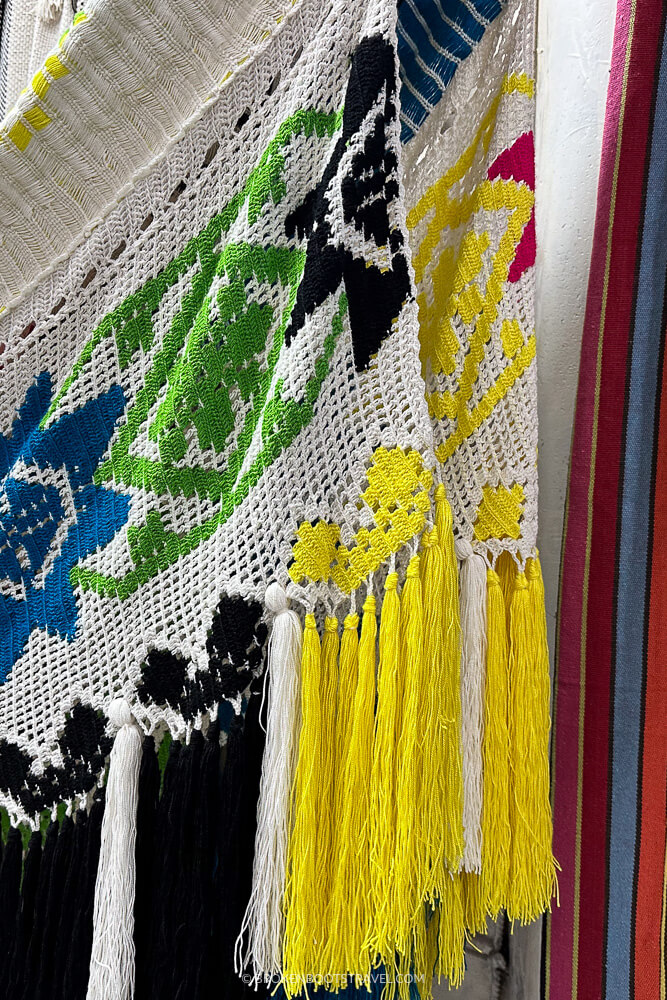
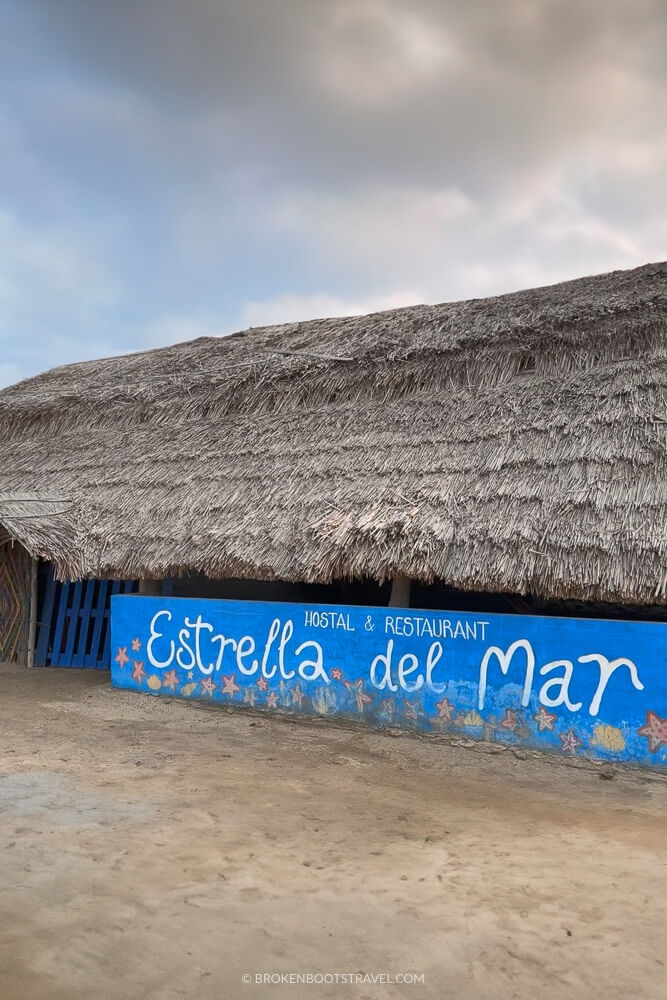
Once I arrived in Cabo de la Vela, I had the rest of the afternoon to spend in town. I ended up renting a chinchorro (Wayuu hammock) at La Estrella del Mar for 15,000 COP a night. There are a lot of accommodations in Cabo for similar prices, though you’ll likely pay more for a proper bed.
💰 DAILY TOTAL: 100,000 COP ($24 USD)
Day 3: Cabo de La Vela
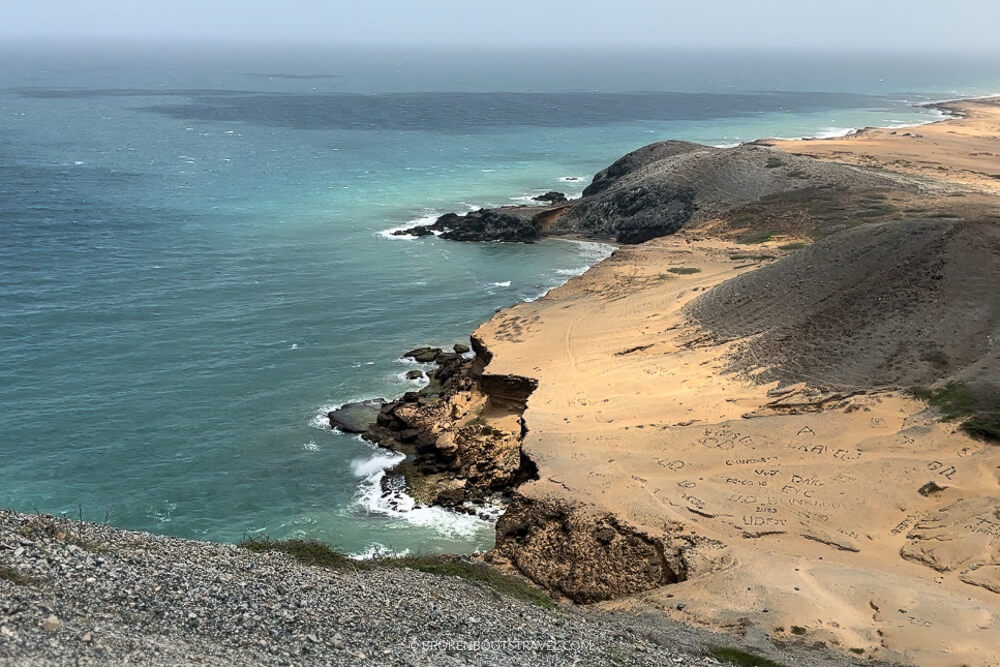
I decided to spend a day exploring the main sites in Cabo de La Vela, so after making myself a PB&J in the hostel kitchen, I headed with some friends to El Pilón de Azucar. This beach is an iconic sight in the area, towering rock cliffs alongside the blue waves of the Caribbean Sea. The Pilon itself can be seen from all around – a triangular mountain of rock, looking over the nearby beach.
While at El Pilon, I spent a whopping 7,000 COP on a Coca Cola. I also paid my friend 20,000 COP (10,000 each way) for the ride to and from El Pilon from town.
Later that afternoon, I spent 15,000 COP on a menú from a local restaurant, which included an asado (steak), vegetables, rice, and a drink. Later that evening, I also went to watch the sunset at the lighthouse, which cost me another 20,000 COP there and back. I yet again stayed in my hammock for 15,000 COP.
Getting Around Cabo de La Vela
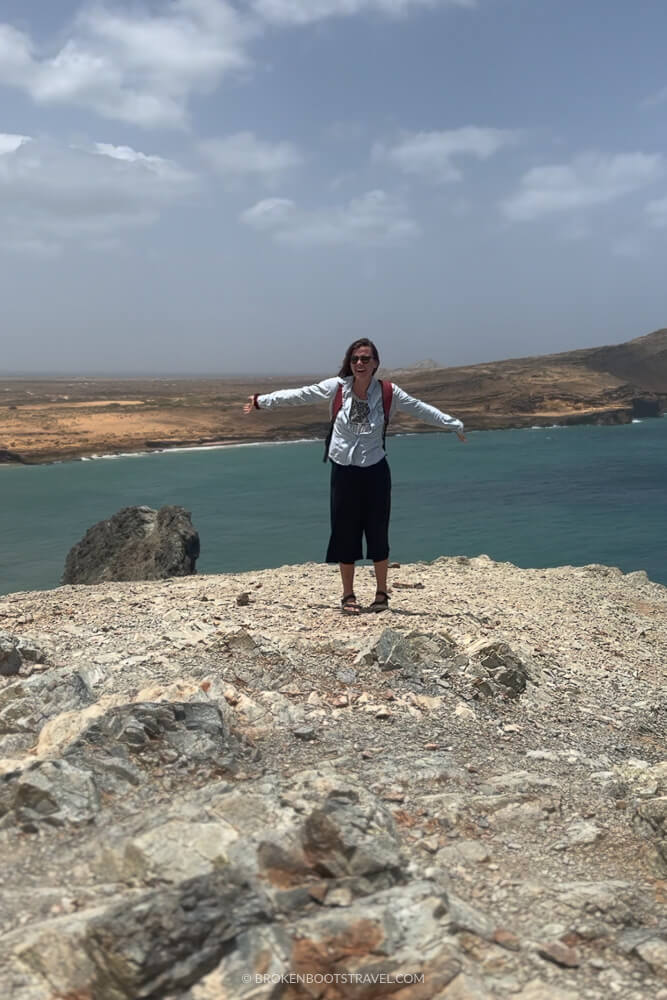
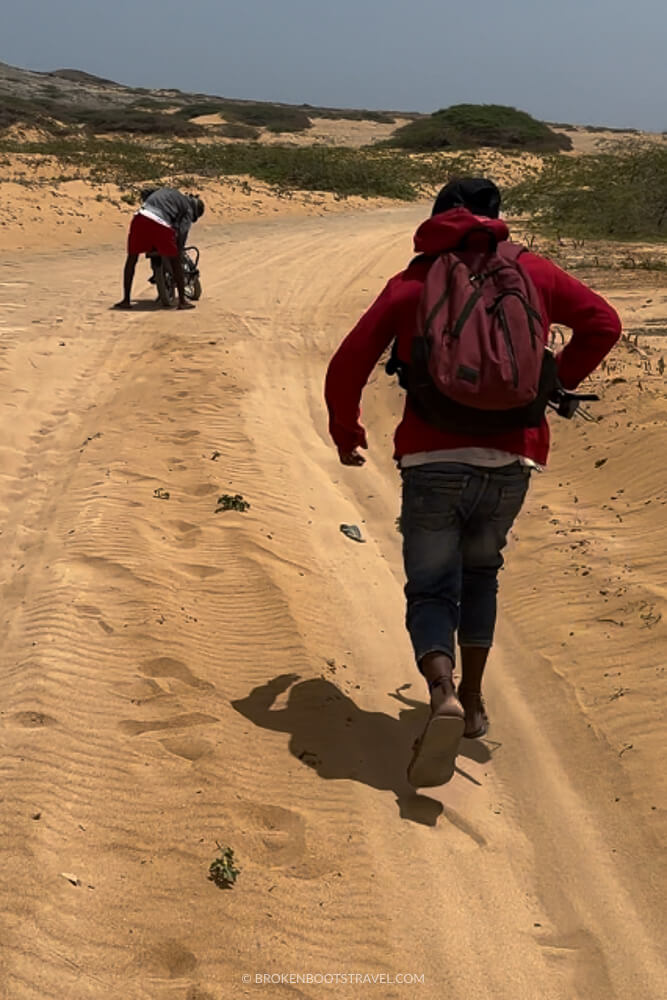
The best and easiest way to get around Cabo de la Vela is via moto taxi. While it is technically possible to walk to many of the sites near town – beaches, the lighthouse, etc – the walk would be long and hot. Moto taxis generally cost about 10,000 each way to any of the major sites around Cabo.
Many hostels will also offer combined packages – the owner of my hostel actually offered me a tour to all of Cabo’s major sites for 40,000 ($10 USD). If you want to see everything Cabo has to offer, this can be a great option.
💰 DAILY TOTAL: 77,000 COP ($18.50 USD)
Day 4: Punta Gallinas
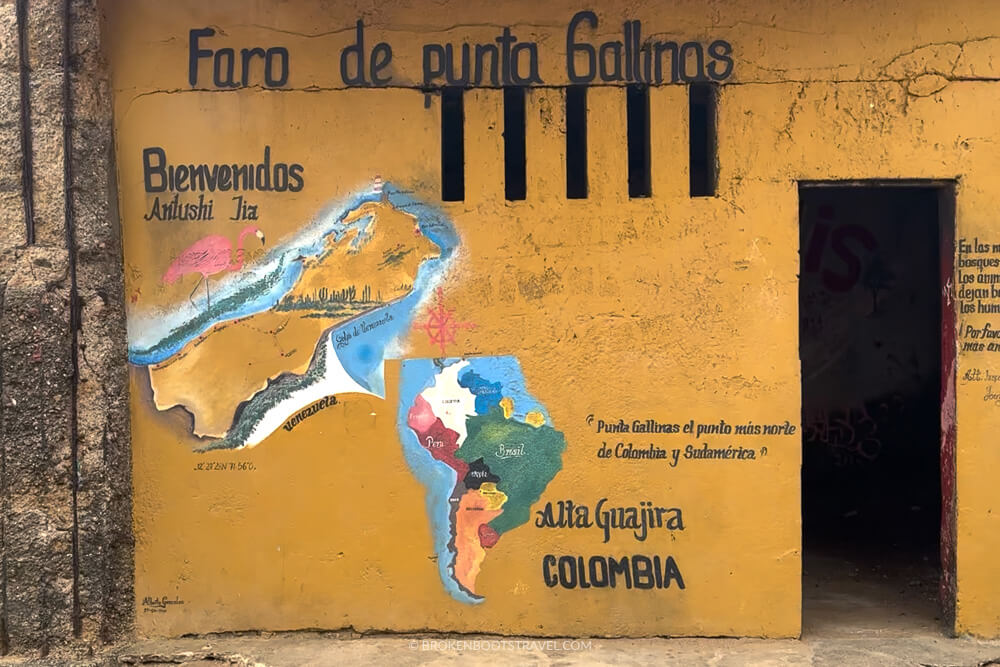
This was by far the most expensive day of my trip, but worth every penny. There’s a reason I consider Punta Gallinas the best thing to do in the department of La Guajira!
To travel to Punta Gallinas, the northernmost point of La Guajira, I needed to travel with a local. I had asked around in Cabo the day before, and the owner of my hostel ended up connecting me with Iisho, a local guide.
I paid Iisho 250,000 COP, which included transportation and our accommodation in Punta Gallinas that night. It was awesome to have a private guide, as we could travel at our own pace and spend longer time in different stops along the way. I did end up buying both Iisho and myself lunch at las Dunas de Taroa for 50,000 COP (25,000 each).
We left Cabo around 5AM, so we had all day to visit a variety of sights in Punta Gallina. The drive north took about 3 hours on the back of the motorbike, with some stops along the way. We visited Las Dunas de Taroa, the lighthouse at Punta Gallinas, and plenty of viewpoints and beaches along the way.
Accommodation in Punta Gallinas
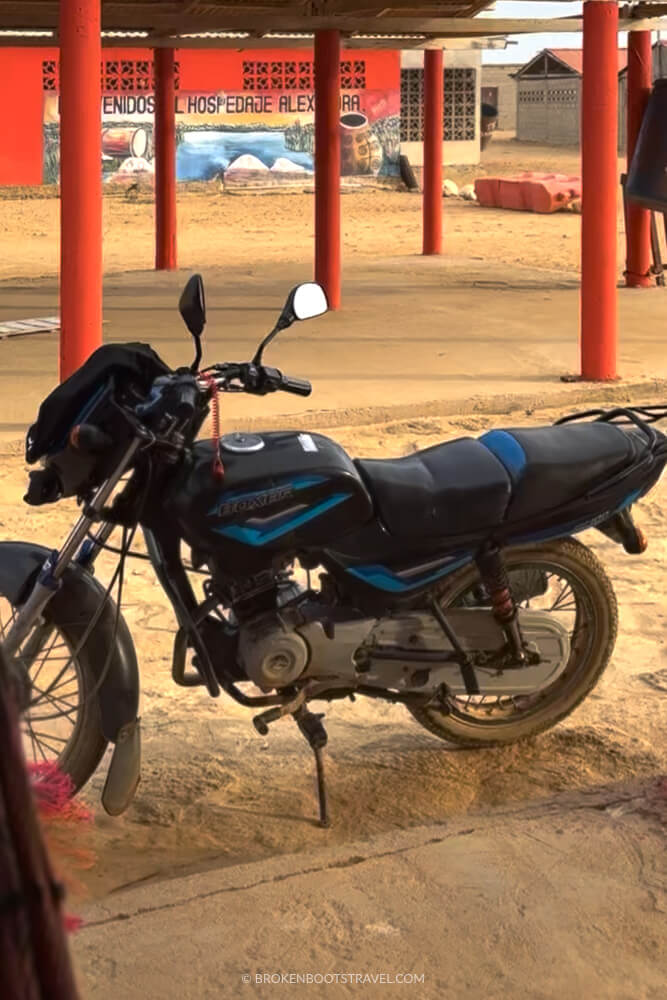
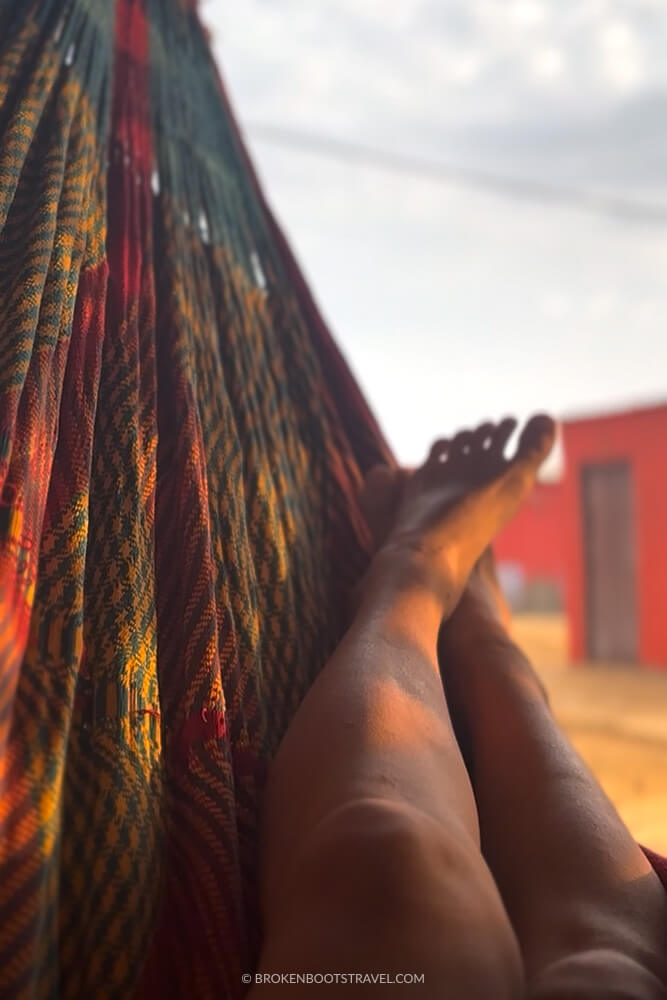
We stayed at Hospedaje Alexandra in Punta Gallinas, which is one of the most popular hostels amongst tour groups and independent travelers alike. While the price had been included in what I paid Iisho, I believe a chinchorro cost 25,000 COP. They also offered meals on site for an additional 25,000 COP.
The hostel was pretty typical of the region, with groups of chinchorros and bathrooms that utilize rainwater. They also had outlets to charge your devices during your stay.
💰 DAILY TOTAL: 300,000 COP ($72.00 USD)
Day 5: Return to Cabo de la Vela
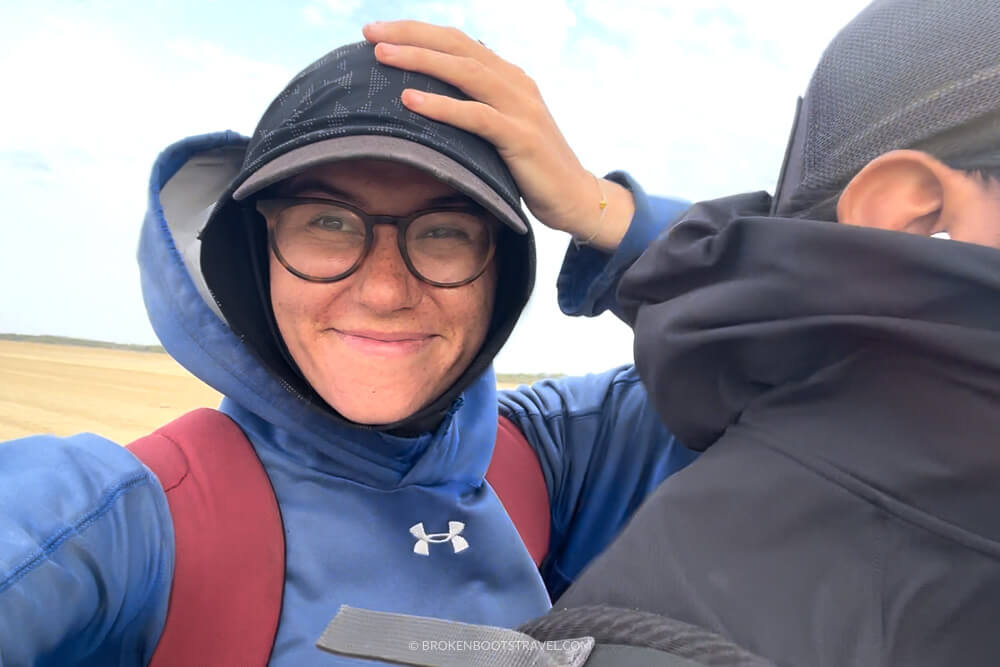
Iisho gave me two options this day – return to Cabo de la Vela, or drive all the way to Uribia. I opted to stay another day in Cabo as there was more I wanted to do in town, but you could save on the price of the 4×4 between Cabo and Uribia by driving directly to Uribia.
To return from Punta Gallinas, we had to cross a small inlet via a boat. The boat cost 15,000 COP, which I paid in cash directly to the driver. Next, Iisho and I headed onwards towards Cabo, taking a few breaks along the way and arriving mid-morning. Since we’d crossed the inlet in the boat, the drive was much shorter this time, only around 2 hours.
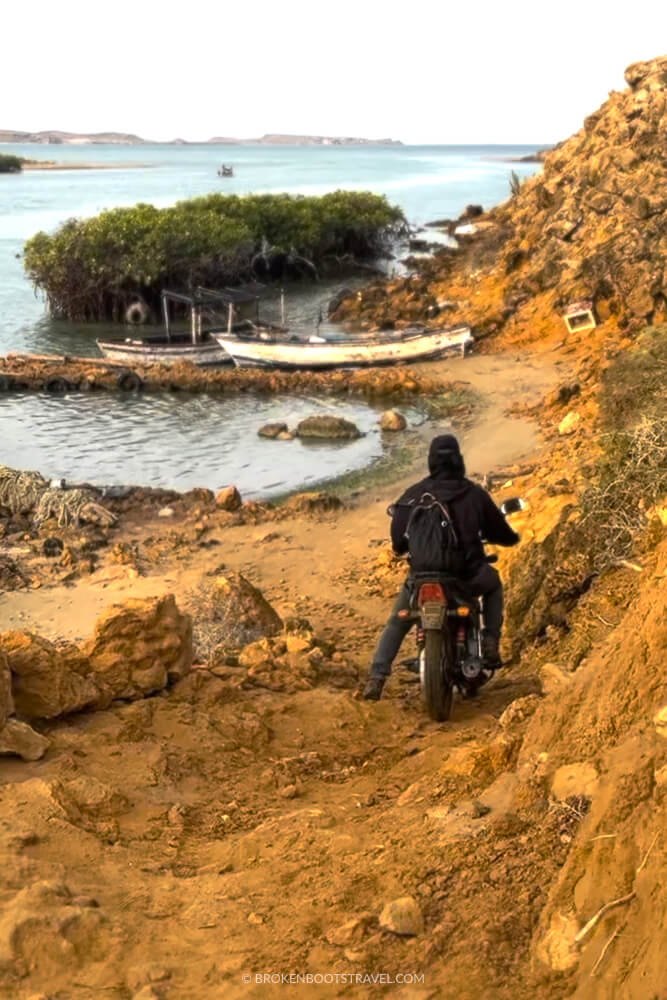
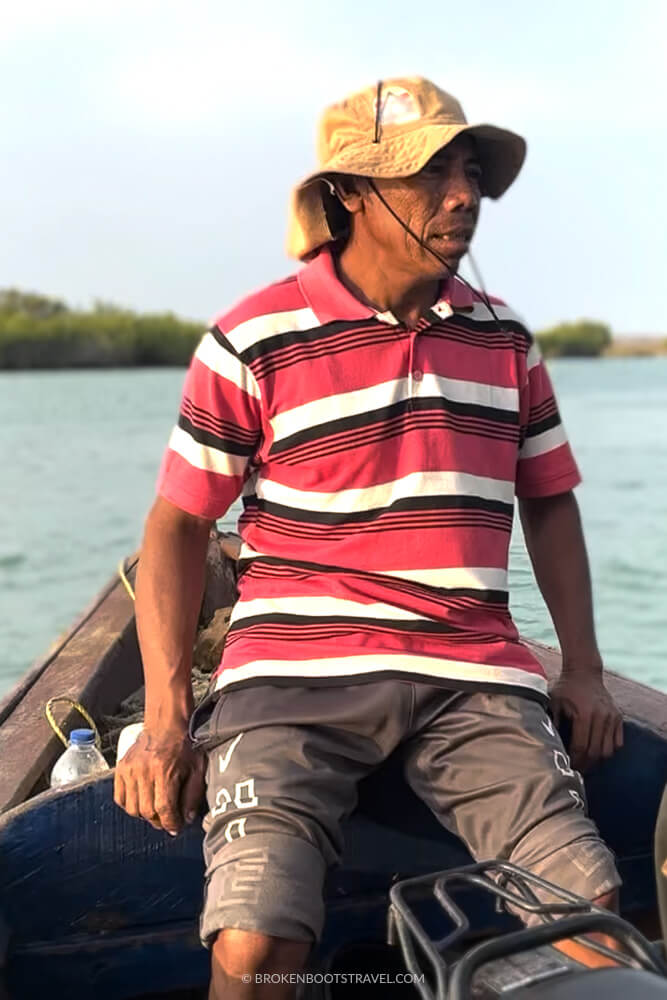
I once again paid 15,000 COP for a hammock at La Estrella del Mar, bought another lunch menú for 15,000 COP, and spent the afternoon relaxing on the beach after my journey to Punta Gallinas. I also bought myself a few snacks in town – a juice, crackers, and sandwich items which totaled around 40,000 COP.
In the evening, Iisho gave me a ride to Rancheria Juya. Every night at 8PM this ranchería offers demonstrations of traditional dances and celebrations, face painting, and Wayuu customs for visitors. A visit to the ranchería costs 25,000 and is a great way to learn more while supporting the local community. I highly recommend it if you have the time visiting Cabo independently.
💰 DAILY TOTAL: 95,000 COP ($23.00 USD)
Day 6: Return to Riohacha
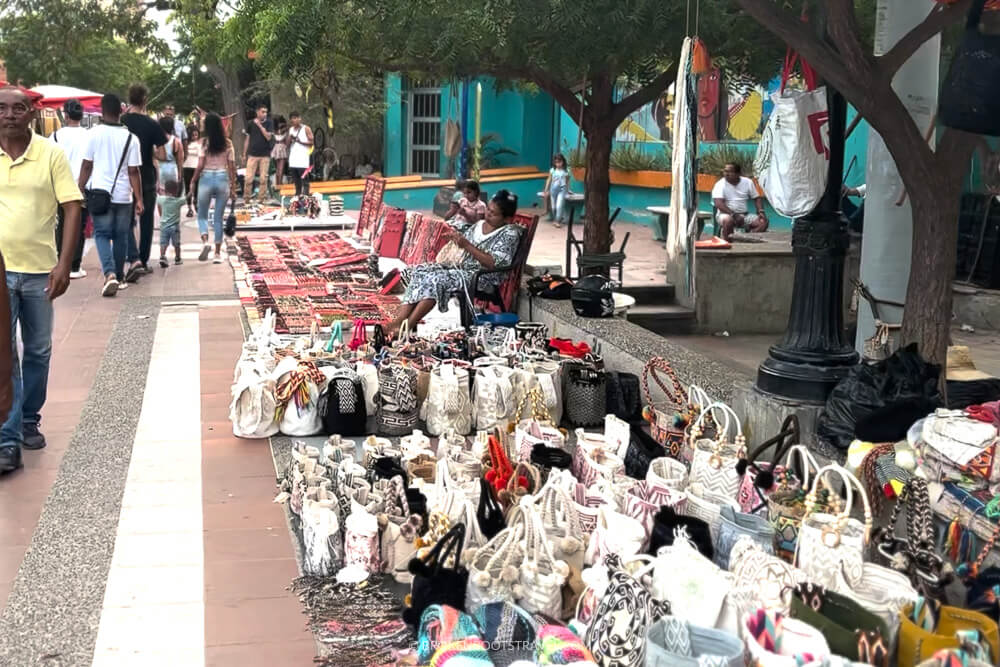
On my final day, I woke up early to catch a 4×4 back to Uribia. Note that these vehicles only leave early in the morning, so unfortunately if you miss it, you’ll have to spend another day in Cabo.
Like before, the 4×4 back to Uribia cost 50,000 COP. Once in Uribia, we were immediately bombarded by drivers offering transportation back to Riohacha. I found a shared car heading to Riohacha for 30,000 COP.
Back in Riohacha, I once again spent the night at Casa Colibrí, unwinding from an incredible trip to the desert!
💰 DAILY TOTAL: 80,000 COP ($20 USD) for transportation
Total Costs to Travel La Guajira without a Tour
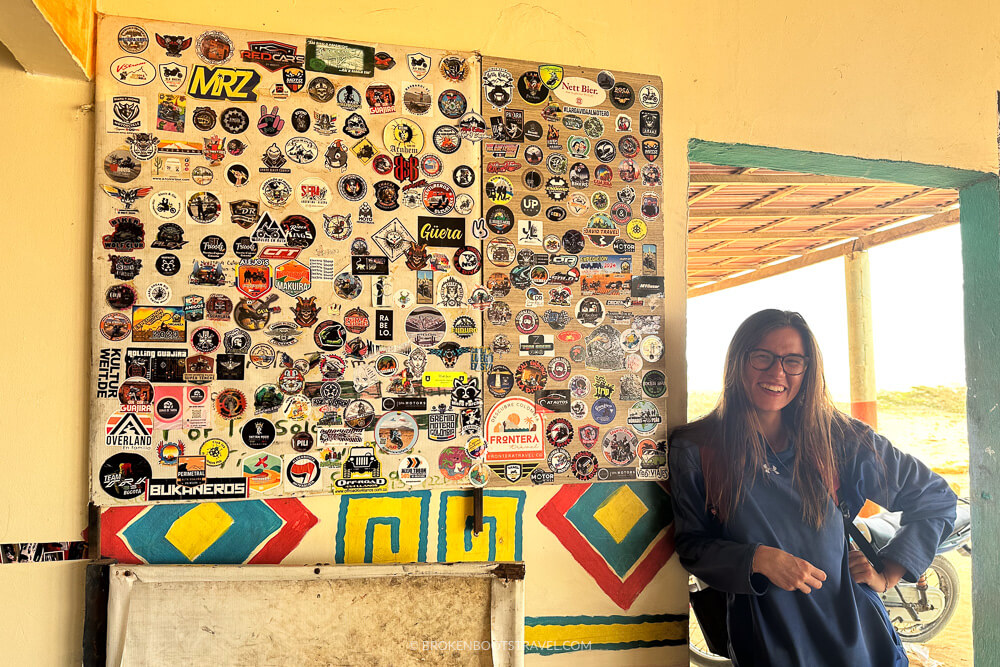
So in case you haven’t been doing the math along the way, that makes my total spent for 6 days traveling through La Guajira 652,000 COP, or around $160 USD as of April 2024. Note that this cost includes both of my days spent in Riohacha at the start and end of my trip.
With most La Guajira guided tours begin around 600,000 COP for 1 night, 2 days, I certainly was able to save plenty each day by traveling independently. I spent 6 days exploring the region, averaging around ~$30 USD every day. I was also able to travel at my own pace and spend more time in each spot along the way.
If you do chose to travel independently from Cabo to Punta Gallinas, I highly recommend my guide Iisho. You can contact him on Whatsapp at +57 300 7587331
Was it Worth it?
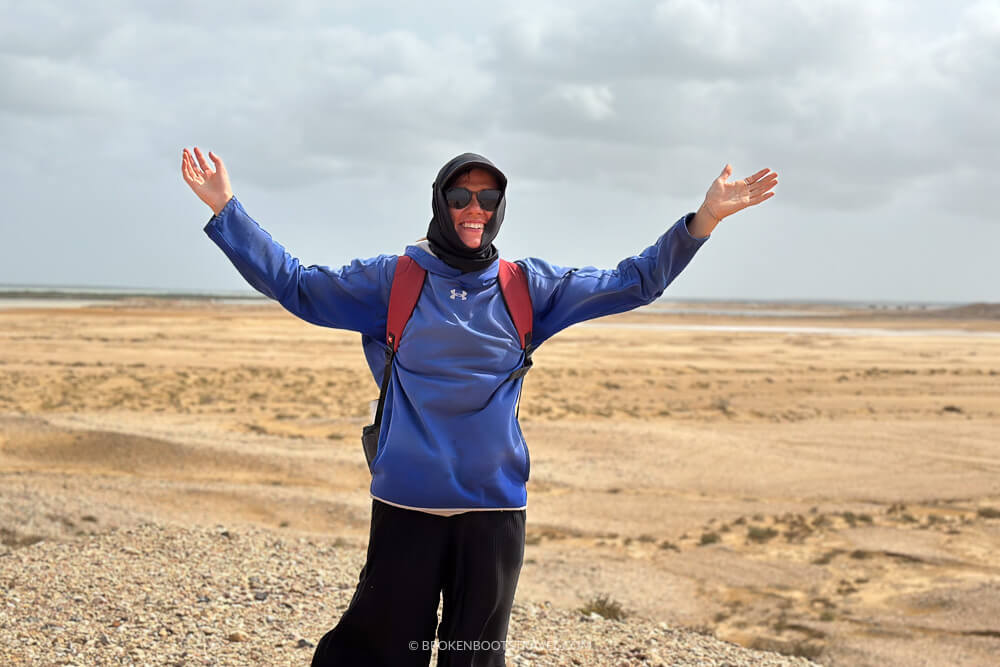
My final conclusion is yes… and no. Since I was traveling to La Guajira as part of my 32 Departments of Colombia project, prioritizing slow travel was a major part of my focus. However, there was certainly extra effort involved in visiting local sites, connecting with people, and getting to know the local culture, and my trip involved a lot of trial and error.
For me, traveling independently was the right choice for my intentions, but I personally think a tour of La Guajira is generally the preferred option. Not only is it more time efficient, but you’ll also have a guide knowledgeable of the local customs and traditions. Not only can this help keep you safe, but can form deeper connections with the area you are visiting.
Just be sure when booking a La Guajira tour to book through an operator that prioritizes respect and understanding of the local culture in the region. My top recommendations are Colibrí Viajes, Guajira Tours, and Magic Tour Colombia.
Have limited time to spend in Colombia? Check out my one-week itinerary to Bogotá and Medellín!
Continue Your Trip
There’s plenty more to see along the Colombian coast, from the colorful colonial streets of Cartagena to Colombia’s Caribbean paradise of San Andres. Whether you’re looking to spend some time city exploring, beach hopping, or coffee-drinking, I’ve written itineraries for adventures all over the country.
Curious to learn more about Colombian culture? Check out my 32 Departments of Colombia project, exploring everything from the bullfights in Sucre to the world’s biggest vallenato festival! Colombia is a country rich in history, art, and stories, and I’m on a mission to explore as much as I can!
Have a question about visiting La Guajira or elsewhere in Colombia? Leave me a comment below and let’s chat!
What to Pack for Colombia
Planning a trip to Colombia? Consider adding some of these essentials to your suitcase for a truly epic trip!
💧 Filtered Water Bottle – Save on the single-use plastic and protect from parasites!
🧥 Heavy-Duty Rain Jacket – For the ever-changing Colombian weather!
🎒 Anti-theft Backpack – Perfect for exploring big cities or trekking in the jungle
🧖♀️ Microfiber Travel Towel – A go-to travel essential anywhere in the world!
🔌 Portable Charger – Keep your phone charged out on the go
🔐 Mini Padlock – Perfect for securing your backpack or locking up your items at the hotel
🔋 Universal Travel Adapter – Charge all your devices anywhere in the world!
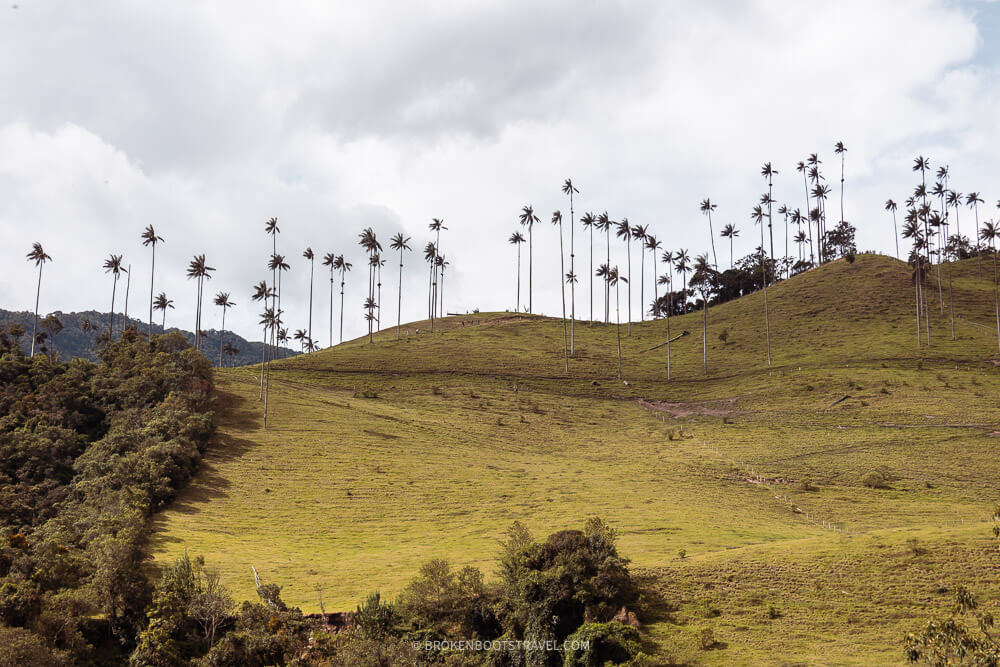
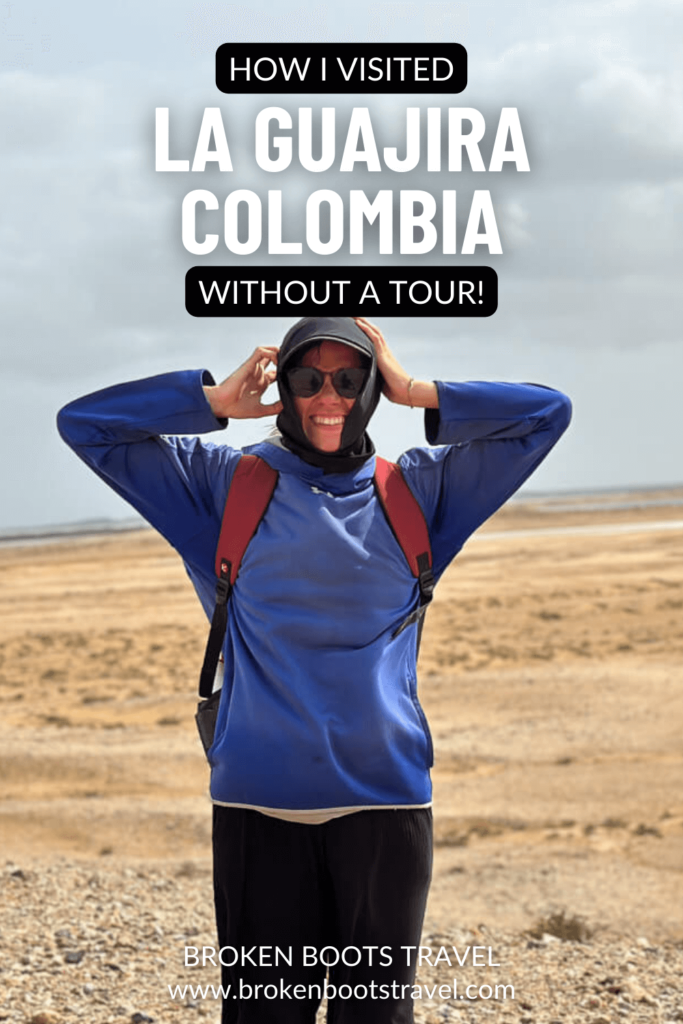
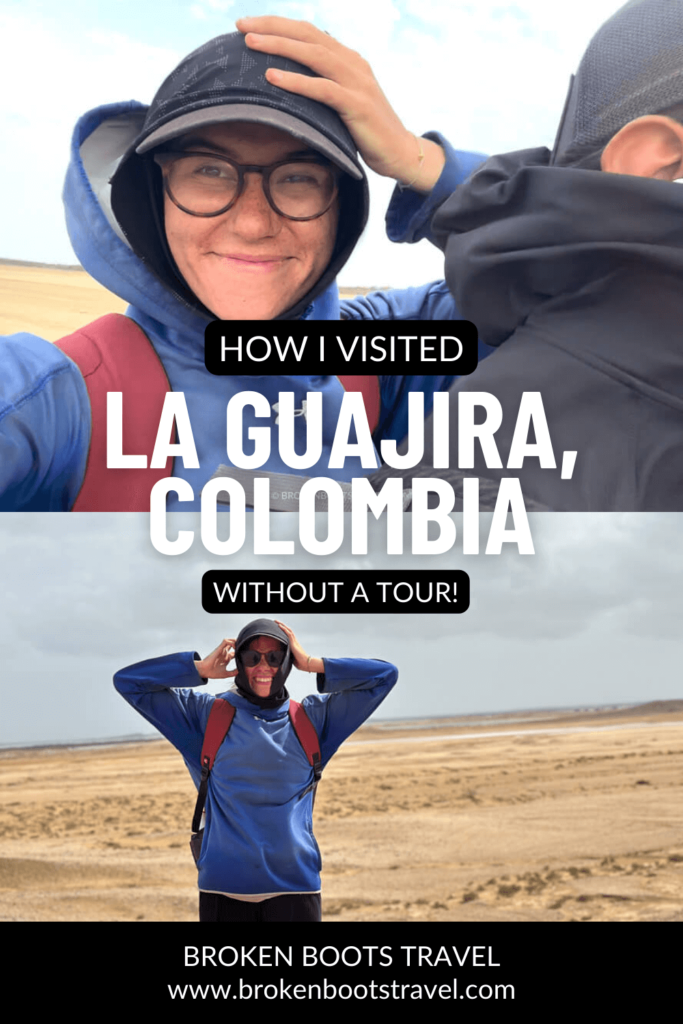
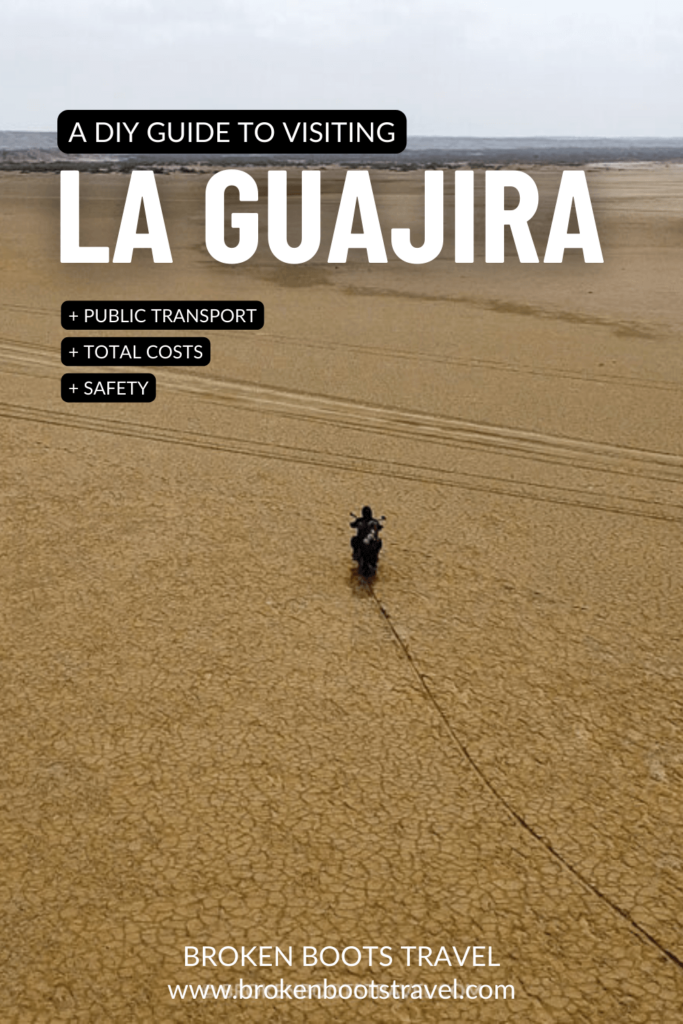
Love stories? Subscribe to my newsletter to get my latest updates delivered straight to your inbox every month. One email a month + no spam? Sign me up!
Virginia Taylor (Ginna) is a travel writer and photographer exploring the world until her boots wear through. She’s currently on a mission to explore all 32 departments of Colombia, though she formerly called the Middle East home. Want to know more? Visit the About Page.
Thank you so much for this information! We will be tackling La Guajira without a guide and will be using all this info. Thanks again!
That is so exciting! Enjoy La Guajira! 🙂
how did it go amber? I also second that this information is so helpful, love your blog! Thanks:)